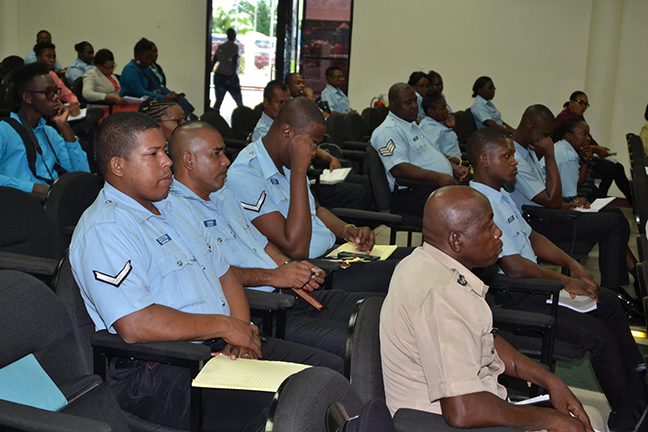As more police officers undergo training to curb noise pollution, Public Security Minister Khemraj Ramjattan has said that their efforts would be supported by a move to revoke the licences of businesses that break the law.
“…You take the profit out of this illegality… that means that if we have to de-register them, we have to do that. Take away their licences that GRA [Guyana Revenue Authority] grants, make it a condition that before you continue to do your bar services… we are going to make a condition that you must adhere to certain noise levels and the minute you breach it we can take that away, that licence,” Ramjattan told those present yesterday at the Police Training Centre for the opening of a two-day Noise Management Training Programme for police officers.
Ramjattan, in his remarks, noted that with developments in society, noise pollution has been on the rise and this has necessitated an inter-agency response. “We also have a number of other partners that we have to deal with, like the NDCs, Central Housing and Planning Authority, Ministry of Public Infrastructure and even the GRA, which comes under the Ministry of Finance, so that we can enforce, collectively, these matters dealing with noise pollution,” he explained.
He noted that the objective of the inter-agency noise nuisance task force is to ensure the enforcement of the laws on noise nuisance, reduce discomfort caused by the noise pollution and “build a culture of law and order across the country.”
Ramjattan added that through the collaboration, the task force has taken a number of initiatives in controlling noise pollution in affected areas. “The task force recommended that bars and liquor restaurants must be soundproof before they are issued with a licence from the GRA…,” the minister noted, while adding that complaints must be dealt with in multiple ways and not just prosecutions and convictions.
Ramjattan told the officers that would be a part of the training session that they too have their part to play in presenting other methods that can be used to curb the noise pollution. He added that in society a balance is required, while noting that law enforcement officers have to know that people would want to enjoy their music and conduct their businesses but in a way which does not infringe on the rights of others. “That is why there is a collision course, especially in a democratic society. In an authoritarian society, you can have the state coming in and literally closing everything down and you have the appearance of law and order but that’s not what we want, we want a democratic society. But in this democratic society we must have that balance” Ramjattan said, while noting that the aim of the task force is not to affect the livelihoods of members of the public but to bring them in compliance with the law regarding noise pollution.
So far, the biggest challenge faced by the task force is the reluctance of persons affected by the noise to agree to give statements to the police against those who are to be charged for the pollution. With that reluctance, cases that are taken before the courts are normally thrown out, according to the minister, because those affected would not be willing to go before the courts and stand as witnesses.
The training programme, which is the result of a collaborative effort of the Environmental Protection Agency (EPA), the Ministry of Public Security and the Guyana Police Force, is the second of its kind and another is planned for October.
Also speaking at the opening ceremony was Executive Director of the EPA Dr Vincent Adams, who urged members of the force to further the capacity building and to take care of the equipment that will be used for carrying out noise management prosecution.
Adams stated that the establishment of the inter-agency noise nuisance task force in 2017 was proof of the agencies’ commitment to address and diminish noise pollution. “The development of any strategy to effectively address noise must be based upon proper scientific collection and evaluation of data,” he said.
He added that the training will expose officers to strategies used to gather noise data, including using noise meters, and analysing data collected. “This data can be used to address noise nuisance cases and alleviate the discomfort of the citizens,” he noted.
While saying that government agencies are working to address the pollution, Adams urged citizens to do their part to reduce noise pollution.
Assistant Commissioner of Police Clifton Hicken also noted that tackling of noise pollution cannot be treated in isolation and the cooperation of members of the public is necessary.
Thirty-one ranks are expected to benefit from the current programme.





